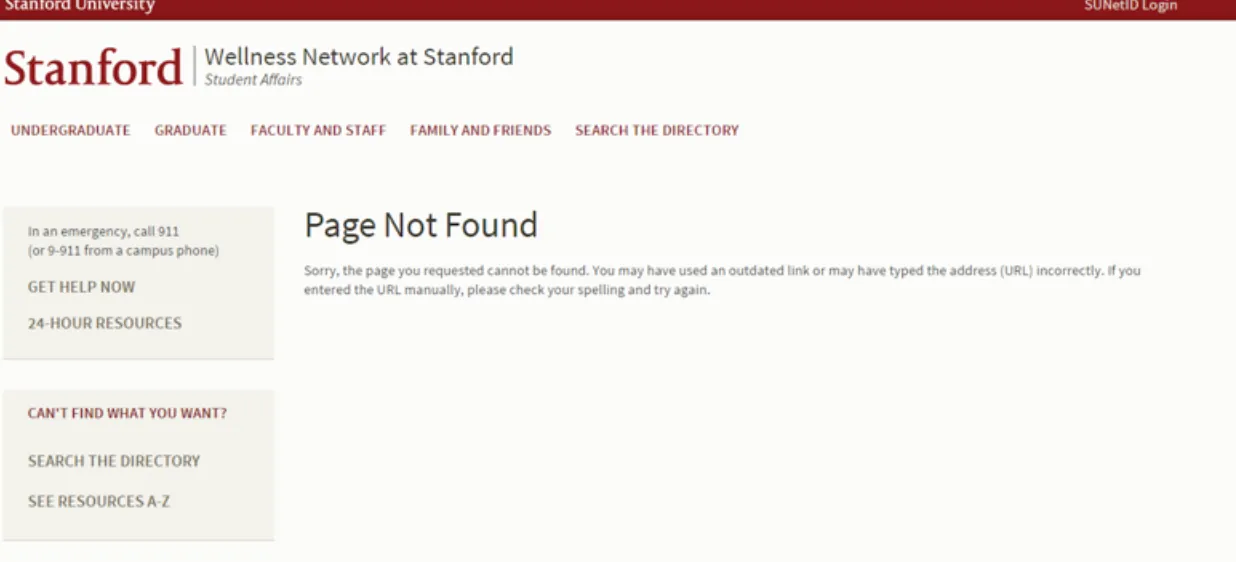Table of Contents
 Richard Heller* was in a tough place and Stanford failed him. As a freshman, he came from an abusive household and a troubled past. In addition to dealing with these ghosts, the intense courseload of Stanford and the various stresses typical of arriving freshmen tore at his psyche. Eventually, the end of a dearly valued relationship moved him to seek psychiatric help. In an interview with the Stanford Review, he shared some of his experiences with Stanford’s psychiatric services: “I started feeling really down all the time, didn’t really feel like getting out of the bed in the morning, wasn’t excited about life at all … I decided it was time to make a call to CAPS (Counseling and Psychological Services) … They advertise emotional support at Stanford so much, I figured I would be in good hands.”
Richard Heller* was in a tough place and Stanford failed him. As a freshman, he came from an abusive household and a troubled past. In addition to dealing with these ghosts, the intense courseload of Stanford and the various stresses typical of arriving freshmen tore at his psyche. Eventually, the end of a dearly valued relationship moved him to seek psychiatric help. In an interview with the Stanford Review, he shared some of his experiences with Stanford’s psychiatric services: “I started feeling really down all the time, didn’t really feel like getting out of the bed in the morning, wasn’t excited about life at all … I decided it was time to make a call to CAPS (Counseling and Psychological Services) … They advertise emotional support at Stanford so much, I figured I would be in good hands.”
When Mr. Heller called CAPS, “someone picked up and asked some very brief questions,” after which he was told “someone would call me within the next few days to discuss my situation in greater detail. I ended up getting my initial call about a week later instead.” When Mr. Heller eventually received a call, “it turned out that the soonest date that they had that wouldn’t conflict with my classes was over a month away.”
These terrible wait times are not unusual. Lark Trumbly, current member of the ASSU Task Force on Mental Health, had to deal with this when she herself sought psychological counseling and treatment during her freshman year. When she attempted to make her first appointment, “the initial intake phone call sound[ed] like a secretary going through a checklist of symptoms … rather than a trained professional.” In years since, when she’s sought therapy outside of the Stanford undergraduate health system, “not a single [other therapy system] has had anything similar.” Though her personal experiences with CAPS was limited to a few months, Ms. Trumbly told The Review in correspondence that she “had many friends come to [her] with complaints about the wait time–by the time they finally get an appointment, they don’t want it anymore.”
For Mr. Heller, however, his desire for counseling remained constant throughout the long month before the day of his appointment. “But then [on] the day of the appointment, I got an email saying that my appointment was cancelled. No explanation, no rescheduling my appointment, nothing. I called the office to see what had happened, and they told that the person I was supposed to meet with was out of town that day.” To say that Mr. Heller was discouraged would be a gross understatement. During his initial phone call, he was explicit about the fact that he “was starting to self-medicate regularly, and felt that I really needed some sort of professional help.” Mr. Heller, after patiently waiting for a month, “I gave up trying to see someone at CAPS, and figured I would be better off dealing with my issues on my own.” During his communications, he told The Review that he often wondered what “you have to tell CAPS to get their attention”.
When Ms. Trumbly was asked about current efforts to address the critical understaffing that forced Mr. Heller to seek help elsewhere, she mentioned that current administrators of the system are “were both very receptive to suggestions,” but that Health Services Administrator Ira Freidman “seem[ed] to be in denial or something … he won’t answer my emails.” On the question of how the average student could potentially help fix this serious issue, she responded that “Students can … talk to administrators directly … [M]aybe if enough of us band together and keep pestering them, they’ll get annoyed enough to answer someone. Maybe.”
Denial is an understandable response from any administrator given how poor Stanford’s Mental Health Services are when compared to similar organizations. In personal correspondence with Mr. Alan E. Siegel, the chief for Mental Health & Counseling Services of MIT, he mentioned that MIT’s services usually start with “a brief triage appointment to provide basic information and to help [them] match the clinician to be seen with the student and his/her problems.” An analogous policy exists at Stanford. However, this is where the similarities end. The triage calls are “done the same day or the next day. … There is no wait for appointments, and they are usually scheduled within one week.” The Review told this information to Mr. Heller, and he responded that he already knew about this: he also had a friend at MIT who told him something similar. Not only is Stanford failing, but Stanford is failing where other supposedly more ‘impersonal’ and ‘cold’ academic institutions are succeeding.
Mr. Heller has assured the Review that, at the moment, he is feeling fine. However, the whole experience has left a bitter and disappointed taste in his mouth. He closed his interview with The Review with a sobering consequence of the gross underfunding that CAPS is currently struggling to overcome. “[I]t is especially disappointing because Stanford advertises CAPS very actively, and assures incoming freshmen that there are people there for them when they need it. Yet when you actually try to reach out and get help… you sort [of] end up feeling more alone than before.”
On the afternoon of January 6th, Jalen Paukan’s death was formally announced to the student body. The first resource advertised to students mourning the death was CAPS, claiming to offer “appointments made for the same day” despite their current inability to properly administer care to those who have required help in prior months. They are still blatantly lying. The Review called them a couple of hours following the announcement, trying to figure out when an appointment was available. Like so many others, we were scheduled for a screening call in two days, with no set date for an appointment. That should bear emphasis: We couldn’t get a next-day extended call when Stanford promised a same-day appointment.
No system is perfect and Stanford presents an unusual challenge for health care administrators due to the massive student body, the high-stress environment, and a culture that largely views emotional outreach as personal weakness. But this kind of negligence, to continue advertising an unavailable service as available, is inexcusable. This is not right. This is not acceptable. It can and should be better.
If you have any experiences with Stanford’s Mental Health System that you wish to be publicized in a similar manner, please contact the Stanford Review through this email. (eic@stanfordreview.org) If you have any ideas for future improvement and wish to directly contact a relevant administrator, please do so to Ira Freidman (ira.friedman@stanford.edu).
*Due to the sensitive nature of the interview, Richard Heller is a pseudonym for someone who wishes to remain anonymous.








